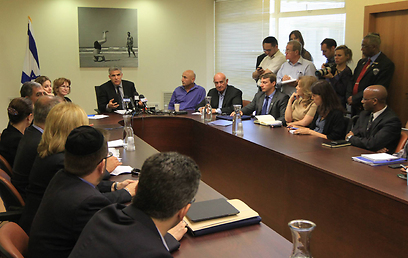
Yair Lapid
צילום: גיל יוחנן
Yesh Atid seeks to safeguard no-confidence motions
Lapid's party counters Yisrael Beiteinu's governance bill with own proposal, but supports raising electoral threshold to 4%
Yair Lapid's Yesh Atid party submitted its response to Avigdor Lieberman's controversial governance bill, opposing the effective abolition of no-confidence motions in Yisrael Beitenu's bill. The law proposal, brought before the Knesset plenum by MK Ronen Hoffman, raises the bar for the actual overthrow of government, yet says no majority is needed to merely put forth such a motion.
Currently, to overthrow a government 61 Knesset members must get behind a motion, yet any faction can put forward no confidence motions. Yisrael Beitenu's bill, ratified on first reading, sought to make the opposition gather a majority prior to the vote, meaning Mondays' no confidence motions, which have become a platform for the opposition to criticize the government, would become a thing of the past.
Related stories:
- Governance Bill approved in preliminary reading
- New bill aimed to beef up power of gov't
- Ministers OK governance bill draft
However, on Hoffman's proposal, it would now take a majority of 65 to achieve the actual overthrow of a government, a measure they say is designed to save the government time-consuming struggles for survival. "The adoption of the procedure means a government can only be overthrown once a realistic, serious alternative is in place."

Yesh Atid factional session (Photo: Gil Yohanan)
Besides no-confidence motions, Yisrael Beitenu's bill, the full title of which is "Increase of Governance and Raising of the Electoral Threshold," is aimed at limiting the number of cabinet ministers to 19 and raising the electoral threshold to 4% of the general vote.
Hoffman's bill too seeks to restrict the number of ministers – to 18 –, adding the clause there can be neither a minister without a portfolio, nor a minister holding more than one portfolio. According to the text of the proposal, this would effectuate an economy in expenses.
The bill also seeks to restrict the number of ministerial deputies to four.
It also upholds the most controversial clause of the governance baw, the raising of the electoral threshold to 4% of the general vote. The move was described as placing the principle of democratic representation at peril, and risking alienating minority groups.
"Our bill is proportionate and represents a balance between the principles key to continuity of governance and strengthening of democracy," Hoffman said. "The ability of the opposition to criticize the government and to submit no confidence motions is maintained, while we uphold the principle of continuity of government."
- Receive Ynetnews updates directly to your desktop










